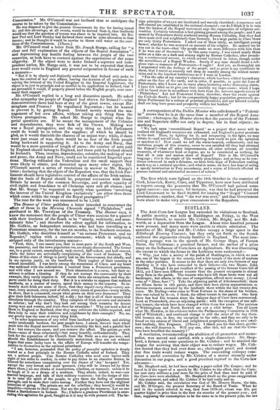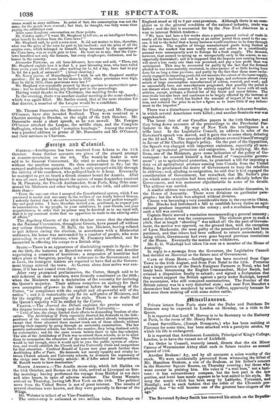SCOTLAND.
The Anti-Corn-law League has extended its visitations to Scotland. A public meeting was held at Haddington on Friday, in the West Secession Church, to receive Mr. Cobden, Mr. Bright, and Mr. Ash- worth, as a deputation from the League. About nine hundred persons were present, and many more were unable to obtain admission. The
speeches of Mr. Bright and Mr. Cobden occupy a large space in the Edinburgh Evening Courant; but they only set forth to the Scotch audience the arguments already familiar in England. The most inte-
resting passage was in the speech of Mr. George Hope, of Fenton Barns, the Chairman ; a practical farmer, and the author of a prize essay on the Influence of Corn-laws on Agriculture. He was illustrating the extent to which the farms in the Lothians were rackrented-
" Why, just take a survey of the parish of Haddington, in which we now are, one of the largest in the county, and a fair sample of the state of matters
in the other parishes. It occurs to me that there are only two farmers of any standing in It who have succeeded to their fathers—the two Messrs. John Howden. Though I do not recollect of the passing of the famous Corn-bill of 1815, yet I have seen different tenants than the present occupants in almost every farm in the parish. The tenants who have left these farms were not all bankrupts; but others, in the race of competition, offered more money. (Loud cries of "Hear, hear! ") Take the adjoining parish of Athelstaneford : there are fifteen farms in this parish, and there have been eleven sequestrations oi distress-warrants executed by the landlords there within the last twenty-five years. Mr. Darling—who came to West Fortune in the shoes of his brother, who was ruined by it—is, I think, the oldest tenant in the parish. One farm there has had five tenants since the halcyon days of Corn-laws commenced. Look at Prestonkirk, also an adjoining parish : with the exception of one soli- tary tenant, the whole have been changed within these few years. The parishes of Whittingham and North Berwick are not a whit better. You all know what Mr. Howden, in his evidence before the Parliamentary Committee in 1836 said of Whitekirk ; and continued change is still the order of the day there. Old tenants are, in fine, the exception to the rule ; and they are only to be
found on the estates of liberal and enlightened proprietors, like my own erred- lent landlady, Mrs. Ferguson. (Cheers.) I thank you for that cheer, gentle- men ; she well deserves It. Will any one, after this, tell me that the Corn- laws have benefited the tenantry?"
A resolution, recommending the abolition of all protection and mono- polies, was moved and carried, with a single dissentient. Mr. Shep-
herd, a farmer, put some questions to Mr. Cobden ; and he assailed the League for avowing that their object was to reduce wages. Mr. Cob- den denied that they had ever done so ; challenged proof, and denied that free trade would reduce wages. The succeeding colloquy com- prises a useful correction by Mr. Cobden of a matter recently under discussion in our pages, and a good practical reproof to the Corn-law advocate—
Mr. Shepherd said, he had been reading a paper called The League; and he found in it the report of a speech by Mr. Cobden to the effect, that the Corn- law cost sixty millions • year more for the price of food than need be paid if the Corn-laws were abolished. Mr. Shepherd dwelt on the gross exaggeration of this statement, and asked Mr. Cobden if he had really said so.
Mr. Cobden said, the calculation was that of Mr. Deacon Hume, the late, and Mr. M'Gregor, the present Secretary of the Board of Trade. What he said in the speech referred to was, that from 1839-41, wheat was 20s. per quarter higher in price than in the first six months of the present year ; and that, supposing the consumption to be the same as in the present year, the inc
crease would be sixty millions. In point of fact, the consumption was not the same, for the people were starved; but that, he thought, was fully worse than paying the additional cost. After some desultory conversation on these points, Mr. Cobden said—" I want Mr. Shepherd to tell me, as an intelligent farmer, what benefit he derives from the Corn-laws?"
Mr. Shepherd said, he paid a corn-rent. It did not matter to him, therefore, what was the price of the corn he paid to his landlord ; and the price of all the surplus corn, which belonged to himself, being increased by the operation of the Corn-laws, was so much gain to him. He went on to say, that the Corn- laws benefited not only the farmers, but every shopkeeper, tradesman, and la- bourer in the country.
Alexander Porteous, an old farm-labourer, here rose and said, "Then, can Mr. Shepherd explain bow it is that I, a poor labouring man, who have toiled from seven years old till now, after working for is. 6d. a day, have had to pay 35. 6d. for a peck of oatmeal ?" (Great cheering.)
Mr. Kemp junior, of Musselburgh—" I wish to ask Mr. Shepherd another question : did he pay more for his shoes in 1838, when provisions were high, than he did in 1835, when provisions were low ? " Mr. Shepherd was repeatedly pressed by these querists to answer their ques- tions; but he declined taking any further part in the proceedings. Having voted thanks to the Chairman, the meeting broke up. In the evening, there was another similar meeting at the same church ; which was again filled. Mr. Smiles stated, that at the next election for that district, a member of the League would be a candidate.
Mr. Thomas Duncombe, the Member for Finsbury, and Mr. Feargus O'Connor, have also invaded Scotland. They were received at a Chartist meeting in Dundee, on the night of the 24th October. Mr. Duncombe made a short speech, as he was unwell. Mr. Feargns O'Connor attacked the League, the middle class, and the Complete Suffragists, whom be called "complete humbugs." Among the oratory was a poetical address in praise of Mr. Duncombe and Mr. O'Connor, and their services to Chartism.



























 Previous page
Previous page